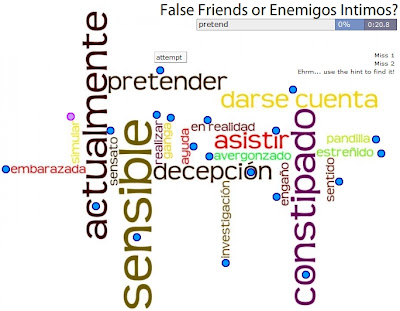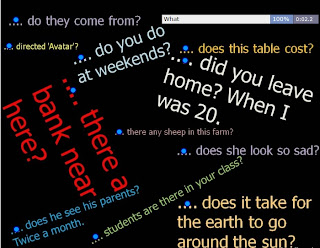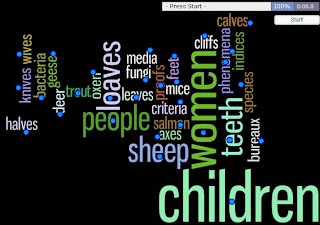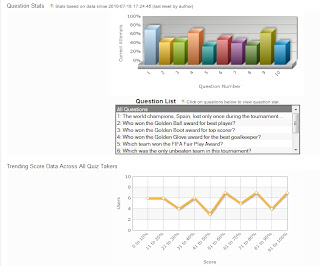Here are a couple more games on places in town series. Be sure to try the other activities, too. Click here.
Sunday, 31 October 2010
Friday, 29 October 2010
Thursday, 28 October 2010
False Friends or Enemigos Íntimos? Examples + Game
When we are learning a language, we tend to, quite naturally, use familiar-sounding words in a context which we subconciously assume to be correct. This often happens with languages with the same roots like Latin, for example. As we know, many English words are derived from Latin, which is the main source for languages such as French, Italian, Portuguese and Spanish.
Some words, indeed, have similar meanings, but there are many that don't, which can result in rather embarrassing situations.
A Spanish or Portuguese, for example, may say, 'I pretend to assist you in your class', which will find a non-Latin-speaking English teacher responding with a blank stare.
Words like these are known as false cognates, or more commonly, false friends or 'amigos falsos'.
Below are some common examples of Spanish false friends.
actual (SP: present, current; ENG: used to emphasise that something is real, which leads to another false friend as 'real' in Spanish means 'royal'!)
asistir (SP: to attend; ENG: assist = to help)
constipación (SP: a cold; ENG: constipated = have trouble going to the loo, 'estreñido')
decepción (SP: disappointment; ENG: deception = trickery)
dormitorio (SP: bedroom; ENG: a large room where a lot of people sleep)
embarazada (SP: to be pregnant; ENG: embarrassed = ashamed)
en absoluto (SP: not at all; ENG: absolutely = completely)
éxito (SP: success; ENG: exit = way out)
ganga (SP: bargain; ENG: gang = 'pandilla')
historia (although it also means 'history', it is often used to mean 'story', as in 'historia de amor')
investigación (in Spanish, it is also used to mean 'research'; in English, we normally investigate such things as crime and accidents)
librería (SP: bookshop. A library is 'biblioteca' in Spanish. A newsagent or a corner shop can be known as 'estanco')
preservativo (SP: contraceptive; ENG: preservative = 'conservante', and conservative = 'conservador')
pretender (SP: to try; ENG: pretend = fake, 'fingir', 'simular')
realizar (SP: to carry out; ENG: realise = to know and understand, 'darse cuenta')
régimen (In hotels, it is used to refer the type of meal arrangement (board): alojamiento y desayuno = bed and breakfast; media pensión = half board; pensión completa = full board. In English, we used regimen to mean a programme of medical treatment, exercise, or special food for improving your health or appearance. So, a hotel receptionist wouldn't say, 'What type of regimen would you like?')
sensible (SP: sensitive; ENG: reasonable and practical. Sensible in English would mean 'sensato' , 'prudente' or 'razonable')
Click on the image above to play a point-and-click game. Feedback would be most welcome.
If you like this, you may like this one, too: False Friends II
Click on the image above to play a point-and-click game. Feedback would be most welcome.
If you like this, you may like this one, too: False Friends II
Wednesday, 27 October 2010
a cLiL to cLiMB, New Look
Regular readers might have noticed some changes I've incorporated recently, the most obvious being the new header. It's been a long time coming, but I finally got around to redesigning it and tried to make it look a little trendier. Have I achieved that? Let me know if you like it (or don't)!
Also, I've just installed a cool little tool called Snap Shots that enhances links with visual previews of the destination site. Sometimes Snap Shots bring you the information you need, without your having to leave the site, while other times it lets you "look ahead," before deciding if you want to follow a link or not.
Should you decide this is not for you, just click the Options icon in the upper right corner of the Snap Shot and opt-out.
Finally, I've been avoiding it since I began the blog, but unfortunately, my personal situation dictates that I can no longer afford not to keep this blog ad-free. This blog consumes a lot of my personal time, and my only reward so far has been some personal satisfaction. I hope it will not detract you from your enjoyment, and if you could, any support will be most appreciated.
Halloween Q&A Game
Last updated: 27 Oct 2010 22:08, BST (GMT+1)
I forgot to publish the game! Sorry!
A little game to combine questions practice and Halloween! You might also like this post: http://aclil2climb.blogspot.com/2009/10/ideas-for-halloween-in-classroom.html
I forgot to publish the game! Sorry!
A little game to combine questions practice and Halloween! You might also like this post: http://aclil2climb.blogspot.com/2009/10/ideas-for-halloween-in-classroom.html
Labels:
activities,
basic,
elementary,
games,
Halloween,
intermediate,
Q+A,
questions
Tuesday, 26 October 2010
Teaching students to ask questions
Many students have problems structuring questions correctly. It could be that this is due to their teachers asking the questions most of the time, or it could just be that constructing questions in English is somewhat more complicated than in other languages.
Let's run through the main rules again.
First, make sure students know what an auxiliary verb is. An auxiliary verb is a 'helping verb'. It helps another verb (the main one) in the same sentence. Examples are the verb to be, do, have, and the modal verbs, such as can, will, and may:
He is playing football at the moment.
Butterflies can’t bite, but they can fly.
You must speak more English in class.
In a question, an auxiliary verb comes before the subject. If there is no auxiliary, we use DO, DOES or DID. However, DO is not used together when there is another auxiliary verb, e. g. BE.
Do you like hip-hop? (NOT: Like you hip-hop?)
Did you like the film? (NOT: Liked you the film?)
Are you paying attention to me? (NOT: Do you are paying attention to me?)
Is she usually at home in the evening? (NOT: Does she usually is at home in the evening?)
You can answer this type of questions with 'yes' or 'no'.
To ask for more information, we use question words. These usually come at the beginning of the question:
Who said that?
Which is your sister?
Whose pen is this?
What did she want?
Why are you laughing?
We can't answer these type of questions with a yes/no. Remember that we use 'do' only when there are no other auxiliary verbs present.
When the question word is the subject, the question word comes before the verb, and 'do' is not normally used:
Who left the windows open? (NOT: Who did leave the windows open?)
Answer: Cristina left them open. ('Who' asks for Cristina, the subject of the answer)
How many students want to come to my class? (NOT: How many students do want to come to my class?)
Answer: Seven students want to come to your class.
When a question word is the object, do is used:
Who do you want to speak to?
Answer: I want to speak to the headmaster. ('Who' asks for the headmaster, the object)
What do you think of the film?
Answer: I think the film was wonderful!
NEGATIVES
We make negative verb forms by putting not after an auxiliary:
It is not raining (It isn’t raining).
I can’t swim (I cannot swim).
I’m not Chinese.
Do is normally used if there is no other auxiliary verb:
I like the salad, but I don’t like the soup. (NOT I like not the soup.)
I don’t think Sharon is as friendly as María. (NOT I think not...)
Do is followed by the infinitive without to:
I didn’t think. (NOT I didn’t to think, I didn’t thought, or I didn’t thinking)
To practise, take a look at this mind map. It has been adapted from Karenne Sylvester's, from her article, first published on 20th Oct 2010, on Kalinago English, 'The Easiest Speaking Game In The World'.
Draw it on the board, leaving the circle (well, all right, it isn't really a circle) in the centre blank. You can play it as a game, dividing the students in groups. It doesn't really require much explanation, but to make sure they understand, put a topic in the middle (something you've been doing with them recently, e.g. music). Ask a student what she thinks is required. Elicit an example. Elicit a few more from other students.
Then, write a list of topics (or elicit from the students themselves) on the board. Assign one topic to each group. Tell them to ask each other questions based on their topic. Discourage written preparation. Encourage them to speak to each other on the fly. Monitor closely.
And, here's a quick online game. Match the question word or the auxiliary to the right question. Please register, if you haven't done so already, before playing the game, and do leave a comment!
Labels:
activities,
basic,
conversation,
elementary,
games,
grammar,
lesson plans,
questions,
speaking
Friday, 22 October 2010
Plurals Spelling rules + Games
Regular Plurals
The plural of most nouns are formed by adding 's' at the end of the singular noun: cup - cups, snake - snakes, bicycle - bicycles. However, there are some special cases.
We add 'es' to nouns that end in s, x, z, ch, or sh.
bus - buses
box - boxes
waltz - waltzes
match - matches
brush - brushes
We also add 'es' to nouns ending with o.
echo - echoes
tomato - tomatoes
potato - potatoes
hero - heroes
However, not all nouns ending with o have an -es ending.
For nouns ending in a vowel + o, we just add an s.
kangaroo - kangaroos
radio - radios
zoo - zoos
The following words also have just an s added. Most 'new' words also follow this rule.
commando - commandos
concerto - concertos
Eskimo - Eskimos
kilo - kilos
logo - logos
photo - photos
piano - pianos
solo - solos
soprano - sopranos
Some words ending with an o can have either s or es added.
tornado - tornados, tornadoes
mosquito - mosquitos, mosquitoes
volcano - volcanos, volcanoes
For nouns ending in a consonant + y, we remove the y and add ies.
baby - babies
city - cities
ferry - ferries
lady - ladies
party - parties
strawberry - strawberries
However, if the y is preceded by a vowel, we just add an s.
holiday - holidays
monkey - monkeys
boy - boys
Irregular plurals
For irregular nouns ending in f or fe, we remove the f or fe, and add ves.
calf - calves
half - halves
knife - knives
leaf - leaves
thief - thieves
wife - wives
loaf - loaves
Some nouns ending in f are considered regular.
belief - beliefs
cliff - cliffs
proof - proofs
These nouns below, mostly of old English origin, are irregular plurals that do not follow the other spelling rules. The plurals have a different vowel sound from its singular version.
foot - feet
goose - geese
man - men
mouse - mice
person - people
tooth - teeth
woman - women
Some nouns referring to groups of animal have the same singular and plural form.
bison - bison
deer - deer
moose - moose
salmon - salmon
sheep - sheep
trout - trout
Words of foreign origin have special plurals, which generally follow the original rules.
analysis - analyses
bacterium - bacteria
cactus - cacti
fungus - fungi
criterion - criteria
medium - media
Here are some games for you to practise. These games have been designed to be played more than once if you want to reap the benefits. The objective is to keep on improving your scores, and you will learn the plural forms even if subconsciously.
The list of nouns changes each time you play a new game!
Point and click the regular plural form
Labels:
activities,
basic,
elementary,
games,
grammar,
plurals,
spelling,
vocabulary
Thursday, 21 October 2010
ProProfs Quiz Maker Review + Regular Past Simple Pronunciation Quiz
Being a strong advocate of a paperless classroom, I am constantly on the lookout for good tools to help us achieve that goal. Frequent readers of this blog would have seen me used various sites and software to create my online activities. Today, I would like to share ProProfs with you. An example of a quiz I'd made with ProProfs can be seen here: World Cup 2010 Trivia, and another one at the end of this post.
Like a lot of commercial software and web-based services, there is a free version and a paid version. The good news is that, for educational purposes, the paid version now costs only $2.97 per month! The additional features you will get for the paid version are a tracking service on who took your quiz, no advertisements, a quiz analytics, and the ability to store, view and download quiz results.
You can also opt for the option for an email to be sent to you each time someone takes your quizzes.
There are two types of quiz you can create with ProProfs: a scored quiz where each question has a right or wrong answer, or a personality quiz where there are no right or wrong answers.
The scored quiz gives you 5 different choices: multiple choice, checkboxes, true/false, fill-in-the-blanks, and essay type questions.
You are allowed to mix different types of questions in your quiz. Videos and images can be added, but not plain sound files. In multiple choice, more answers can be added to the default of 3. How many? More than you'd ever need!
Embedding the quiz in your website is also very easy, with options to customise it to your own liking. You may edit your quiz whenever you like, but be aware that editing it will reset all statistics to zero.
My verdict: If all you need is a simple multiple choice type of quiz, ProProfs is easy to use, and it's cheap. I would like to see more variety added, e.g., matching type questions (word to word and word to image), and the ability to preview and save the quiz before publishing it would be nice. As quiz makers would know, we sometimes need a break, or we run out of inspiration, or the PC crashes... All it would need are separate buttons to preview, save and publish. As it is at the moment, I would have to mark a partial quiz as private, and use the submit button to save it. When I'm ready to publish it, I'd just have to remember to flag it as public again.
Another little thing I find lacking is a question number! It's rather annoying to have to keep on scrolling up and counting how many questions you've created. Just to show you how important this is, I had intended to prepare 15 questions for the quiz below, and I could have sworn I counted 15!
Here's a sample quiz I prepared. If you like this quiz, you may also like this: http://aclil2climb.blogspot.com/2009/10/pronunciation-of-regular-past-simple.html
Tuesday, 19 October 2010
Basic Art Material
Last Updated: 01 Nov 2010
A better view of the presentation can be seen here: http://aclil2climb.blogspot.com/2010/11/basic-art-material.html
First and foremost, please let me remind you that what you see here and on Scribd and Slideshare, is only a review. These reviews do not show animations. If you see this presentation without the animations, you'll just see images and words overlapping each other, and it will just look like something done by someone not knowing what he is doing!
A better view of the presentation can be seen here: http://aclil2climb.blogspot.com/2010/11/basic-art-material.html
First and foremost, please let me remind you that what you see here and on Scribd and Slideshare, is only a review. These reviews do not show animations. If you see this presentation without the animations, you'll just see images and words overlapping each other, and it will just look like something done by someone not knowing what he is doing!
So, if you want to see this, please make sure to download it as a PowerPoint show. This show can also be downloaded from Scribd.
The idea is for it to be used either for teaching basic art material as new vocabulary or for revision.
Each slide is introduced by an image. Prompt the students for the name, and/or the description. The image is followed by the definition, and sometimes by a different image of the same object. Finally, the name is displayed. Where the words are very easy, the definition is displayed before the image.
Don't forget to look at the online game for this lesson: http://aclil2climb.blogspot.com/2010/09/art-material-tagging-game.html
Don't forget to look at the online game for this lesson: http://aclil2climb.blogspot.com/2010/09/art-material-tagging-game.html
For those who prefer non-ICT activities, below are 24 pictures of material we have seen in the PowerPoint show. These pictures can be used as flashcards for classroom games such as bingo, for example. See my post for Instant Bingo.
This set of pictures is also available in José Alberto's Slideshare account.
Basic Art Material Flashcards
Labels:
activities,
art,
CLIL,
elementary,
games,
powerpoint,
vocabulary
Sunday, 17 October 2010
Vowel letter pronunciation for beginners
A lot of Spanish learners (and, no doubt, other Latin learners, too) have problems pronouncing the vowels (a, e, i, o, u) correctly. Often, they either pronounce it as in their own language, or they confuse letters, especially e with i. Last year, José Alberto, from IES Los Tarahales, and I were working on a chart to hang on the classroom wall to help the children remember the right pronunciation. Although pronouncing vowels doesn't really help with general pronunciation, it is very important when they are asked to spell words, or when words are spelled out to them.
Unfortunately, we never did quite finish the chart in time. Although not perfect, we're sharing it here now in case some of you need something like it for your classroom. The same document is also available in José's Slideshare space.
Vowel Letter Pronunciation
Labels:
art,
CLIL,
download,
elementary,
phonetics,
pronunciation
Sounds of English: Tournament!
Regular readers among you will know that I use Purpose Games quite a lot, mainly for point and click activities. Members create regular tournaments, so I decided to start one of my own on none better than the Sounds of English. There are 6 games in the tournament. Even If you haven't got much knowledge on phonetic symbols, don't worry! These games will help you learn them. One of the games isn't very good as the clues include phonetic transcriptions which Purpose Games hasn't been able to handle, but you'll be able to guess them after playing it a couple of times.
Please note that you'll have to be a member of Purpose Games before you can participate in the tournament. Membership is completely free.
Here is the tournament: http://www.purposegames.com/group/a-clil-to-climb/tournament
C'mon! Join in the fun and learn at the same time!
Oh, one more thing - you can play the games as many times as you wish to keep on improving your scores.
Oh, one more thing - you can play the games as many times as you wish to keep on improving your scores.
Labels:
activities,
basic,
elementary,
games,
intermediate,
phonetics,
rhyming slang,
speaking
Saturday, 16 October 2010
Sounds of English, short vs long vowel /ʌ/ /ɑː/
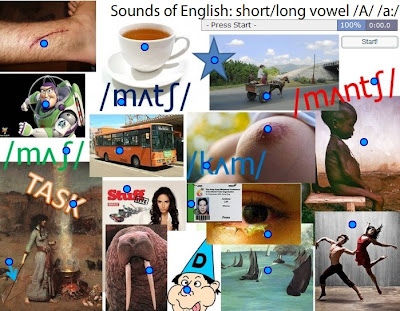
Here is the next game on the sounds of English series. This is to practise the short vowel /ʌ/ and the long vowel /ɑː/.
Click on the image above to begin the game. Try as many times as necessary for you to get 100% right. This is slightly more challenging than the previous one.
If you want to see your name appear on the scoring sheet, you'll have to register before playing. Remember your nickname & password for all my other games which are hosted on Purposegames.
Either way, please leave a comment, stating your score (percentage and time).
You may also like these:
Short vs Long Vowel /ʊ/ and /u:/
Short vs Long Vowel /I/ and /i:/
Rhyming Slang Game
Rhyming Words Game
Pronunciation of Regular Past Simple
Cockney Rhyming Slang
You may also like these:
Short vs Long Vowel /ʊ/ and /u:/
Short vs Long Vowel /I/ and /i:/
Rhyming Slang Game
Rhyming Words Game
Pronunciation of Regular Past Simple
Cockney Rhyming Slang
Look under the category English Sounds for more pronunciation activities.
Sounds of English, short vs long vowel /ʊ/ /u:/

More on the sounds of English. This is to practise the short vowel ʊ and the long vowel u:
Click on the image above to begin the game. Try as many times as necessary for you to get 100% right. This should be easy compared to some of the others on this ongoing series.
If you want to see your name appear on the scoring sheet, you'll have to register before playing. Remember your nickname & password for all my other games which are hosted on Purposegames.
Either way, please leave a comment, stating your score (percentage and time).
You may also like these:
Short vs Long Vowel I and i:
Rhyming Slang Game
Rhyming Words Game
Pronunciation of Regular Past Simple
Cockney Rhyming Slang
You may also like these:
Short vs Long Vowel I and i:
Rhyming Slang Game
Rhyming Words Game
Pronunciation of Regular Past Simple
Cockney Rhyming Slang
Look under the category English Sounds for more pronunciation activities.
Labels:
activities,
basic,
elementary,
games,
intermediate,
phonetics,
pronunciation
Friday, 15 October 2010
Sounds of English, short vs long vowel /ɪ/ /i:/
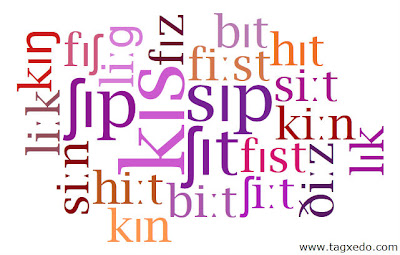
Continuing the series on the sounds of English activities, here's yet another one. This is to practise the short vowel ɪ and the long vowel i:
It's a very important difference, and learning it well may save you from future embarrassments. See The Man Went To Malta.
It's a very important difference, and learning it well may save you from future embarrassments. See The Man Went To Malta.
Click on the image above to begin the game. Try as many times as necessary for you to get 100% right.
If you want to see your name appear on the scoring sheet, you'll have to register before playing. Remember your nickname & password for all my other games which are hosted on Purposegames.
Either way, please leave a comment, stating your score (percentage and time).
You may also like these:
Rhyming Slang Game
Rhyming Words Game
Pronunciation of Regular Past Simple
Cockney Rhyming Slang
You may also like these:
Rhyming Slang Game
Rhyming Words Game
Pronunciation of Regular Past Simple
Cockney Rhyming Slang
Look under the category English Sounds for more pronunciation activities.
Labels:
activities,
advanced,
basic,
elementary,
games,
intermediate,
phonetics,
pronunciation,
speaking
Sports: Play, Do, or Go? Dustbin Game
Learners often have problems with which verb to use with sports and games. We use either go, do or play with most sports, but how do we know which to use?
Generally, with competitive activities, we prefer 'play'. Under this category, we include all ball sports (football, handball, volleyball, golf, rugby, etc). Also included are table games such as cards, chess, table tennis, snooker, and bingo. We use play with badminton and computer games, too.
Note that we use 'play' with 'game': Would you like to play a game of chess? But, we say 'do an activity': What kind of activities do you do at the weekend?
For most recreational activities, or a non-team sport which does not involve the use of a ball, we prefer 'do'. Examples are aerobics, athletics, gymnastics, weights (weightlifting), martial arts (karate, judo, etc), yoga, exercise.
For sports which you can practise individually, we prefer 'go'. When we use go, we add '-ing' to the word. Eg, we say, 'go swimming'. Examples for this category are jogging, windsurfing, horseriding, fishing, dancing, snorkelling, etc.
Are you ready to put yourself to a test? Drag the sport to the correct dustbin. The score at the bottom left is the time you take, so the lower it is, the better you are.
Are you ready to put yourself to a test? Drag the sport to the correct dustbin. The score at the bottom left is the time you take, so the lower it is, the better you are.
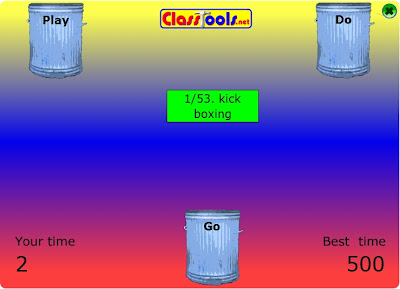
Labels:
activities,
basic,
CLIL,
elementary,
games,
grammar,
sports,
vocabulary
Thursday, 14 October 2010
Cockney Rhyming Slang Game

Yesterday, I published a rhyming word game. Continuing the series on sounds of English activities, I've created a trickier one. This is more suited for higher level students. The clues are expressions of Cockney Rhyming Slang. I'd recommend your reading my post on Cockney slang first before attempting this game. For each clue, you'll have to select the image whose word is represented by the rhyming slang.
Click on the image to begin the game. Just like the other rhyming game, some of the images may not be plain obvious, so you might need a few attempts.
If you want to see your name appear on the scoring sheet, you'll have to register before playing. Remember your nickname & password for all my other games which are hosted on Purposegames.
Either way, please leave a comment, stating your score (percentage and time).
You may also like these:
Pronunciation of Regular Past Simple
Cockney Rhyming Slang
You may also like these:
Pronunciation of Regular Past Simple
Cockney Rhyming Slang
Look under the category English Sounds for more pronunciation activities.
Sports - Double Puzzle
There are quite a few free websites which allow you to create your own activities, and one of those is Puzzlemaker. Here, you can make your own puzzles, such as Word Search, Double Puzzles, Maths Squares, Cryptograms and Mazes. The only price you pay is a link to the website at the end of the document. As an example, I've created a double puzzle on sports.
First, you unscramble each of the clue words. Then, using the circled letters, unscramble these for a hidden message.
Before printing it, think carefully before you do it. Do you really need to? If you have a projector, you can beam the document up, and have a competition to see who is the quickest to solve the puzzle. Have a look at this other activity, too: http://aclil2climb.blogspot.com/2010/09/name-these-sports.html
Before printing it, think carefully before you do it. Do you really need to? If you have a projector, you can beam the document up, and have a competition to see who is the quickest to solve the puzzle. Have a look at this other activity, too: http://aclil2climb.blogspot.com/2010/09/name-these-sports.html
This document can also be downloaded from Scribd.
Labels:
activities,
basic,
CLIL,
download,
elementary,
games,
PE,
sports,
vocabulary
Wednesday, 13 October 2010
Rhyming Words Game

Click on the image to begin the game. You'll have to find the image whose word rhymes with the clues. Some of the images may not be plain obvious, so you might need a few attempts. I'll give a hint for one of them: it's not a bucket!
If you want to see your name appear on the scoring sheet, you'll have to register before playing. Remember your nickname & password for all my other games which are hosted on Purposegames.
Either way, please leave a comment, stating your score (percentage and time).
You may also like these:
Pronunciation of Regular Past Simple
Cockney Rhyming Slang
You may also like these:
Pronunciation of Regular Past Simple
Cockney Rhyming Slang
Look under the category English Sounds for more pronunciation activities.
Tuesday, 12 October 2010
How to create a screenshot of part of your screen?
Most of you using Windows will probably know that you can take an image of your screen by pressing something like ALT and SCRN PRNT together. This is called taking a screenshot.
What this does is basically copy an image of your current screen. You then have to paste it on an image editor, such as PAINT. There might be superfluous information on the image that you would like to remove, but here is where it gets complicated for some people.
Even for someone like me, it gets a little tedious. I would paste it using Paint. I might add notes or highlight some parts of the screen. Then, I would save it in a lossless format, such as TIFF.
Having done that, I'd reopen it on another editor, Microsoft Office Picture Manager, crop the extra bits out, and save it.
Perhaps I can crop it using PAINT, too, but I have never figured a way with which I had been satisfied.
If I need the image in jpg format, I would then reopen it using IRFAN VIEW (my preferred image viewer) and save it in jpg format.
All somewhat of a pain in the neck.
Then, a few days ago, I discovered a nifty freeware tool which does all that, and more. It's called Greenshot. You can download it from here.
When you've installed it, you'll see a Greenshot icon on the bottom right of your screen (system tray). Note that once installed, Greenshot takes over the PRINT key; in other words you can no longer take a screenshot and paste it using PAINT. However, you can change your preferences and tell it not to launch upon startup.
There are four basic ways Greenshot allows you to take a screenshot. If you click on the PRINT key, you can select a part of the screen to be captured. Greenshot calls this REGION CAPTURE. After starting region mode, you will see a crosshair appearing where your mouse is. You don't need to worry too much about this. What you do is move your mouse to the corner of the region you're interested in, click, hold, and drag to define the rectangle you want to copy.
When you release the mouse, the image is copied, and Greenshot's image editor automatically opens (this default can be changed in preferences).
Here, you can add shapes and texts, crop, highlight, and even obfuscate. However, I did find a few weaknesses. The most annoying thing is there isn't a way to undo your edits! Isn't that just amazing? Also, editing texts could do with more versatility. Changing fonts isn't very straightforward, and you can't justify your text.
If you use Shift + Print, you'll capture the last region. For example, in the first image above, I first clicked on Print so that I get the crosshair. To capture the screen plus the green lines, I then click on Shift + Print.
To capture the window which is currently active, use Alt + Print, and to create a screenshot of the complete scree, use Control + Print.
Having edited your screenshot, you can then print it, or save it in jpg, gif, png or bmp format.
Well, until I find something better, I will be using this for my future screenshots! Will you? You can download Greenshot from here.
Friday, 8 October 2010
Our Solar System: Planets (Game)

How fast can you identify the planets in our solar system? Click on the image to test yourself in a simple point-and-click game.
Image source: NASA/JPL - "The planets are shown in the correct order of distance from the Sun, the correct relative sizes, and the correct relative orbital distances. The sizes of the bodies are greatly exaggerated relative to the orbital distances. The faint rings of Jupiter, Uranus, and Neptune are not shown. Eris, Haumea, and Makemake do not appear in the illustration owing to their highly tilted orbits. The dwarf planet Ceres is not shown separately; it resides in the asteroid belt between Mars and Jupiter."
Image source: NASA/JPL - "The planets are shown in the correct order of distance from the Sun, the correct relative sizes, and the correct relative orbital distances. The sizes of the bodies are greatly exaggerated relative to the orbital distances. The faint rings of Jupiter, Uranus, and Neptune are not shown. Eris, Haumea, and Makemake do not appear in the illustration owing to their highly tilted orbits. The dwarf planet Ceres is not shown separately; it resides in the asteroid belt between Mars and Jupiter."
If you want to see your name appear on the scoring sheet, you'll have to register before playing. Remember your nickname & password for all my other games which are hosted on Purposegames.
Either way, please leave a comment, stating your score (percentage and time).
You may be interested in these, too:
Why do we have seasons on Earth?
Phases of the Moon
You may be interested in these, too:
Why do we have seasons on Earth?
Phases of the Moon
Wednesday, 6 October 2010
Musical Instruments Tagging Game (4 parts)
Here are some games to help you learn musical instruments. They are four categories: strings, brass & keyboard, percussion, and woodwind. Just click on the image to begin the game.
If you want to see your name appear on the scoring sheet, you'll have to register before playing. Remember your nickname & password for all my other games which are hosted on Purposegames.
Either way, please leave a comment, stating your score (percentage and time).
Other activities on music you may be interested in:
What type of instruments do they play?
Classify these musical instruments
What type of instruments do they play?
Classify these musical instruments
Labels:
activities,
basic,
CLIL,
elementary,
games,
intermediate,
lists,
music,
vocabulary
Tuesday, 5 October 2010
Games Competition in Purpose Games
Purpose Games have regular tournaments and some of my games are being featured in two of their current ones: Advanced Science @ Not About Speed and The Great Human Anatomy.
Games featured in Advanced Science are: Ecosystems, Laboratory Equipment while The Muscular System is featured in Human Anatomy.
Are you game for it? You'd need to register first before you can participate. Let me know how you get on!
Games featured in Advanced Science are: Ecosystems, Laboratory Equipment while The Muscular System is featured in Human Anatomy.
Are you game for it? You'd need to register first before you can participate. Let me know how you get on!
Sunday, 3 October 2010
Daily Routines Tagging Game

Click on the image to test yourself in a simple point-and-click game on daily routines.
If you want to see your name appear on the scoring sheet, you'll have to register before playing. Remember your nickname & password for all my other games which are hosted on Purposegames.
Either way, please leave a comment, stating your score (percentage and time).
Other activities on daily routines you may be interested in:
Unscramble these jumbled sentences
Offline version
Other activities on daily routines you may be interested in:
Unscramble these jumbled sentences
Offline version
Labels:
activities,
basic,
CLIL,
daily routines,
elementary,
games,
grammar,
present simple,
tenses,
vocabulary
Subscribe to:
Comments (Atom)




